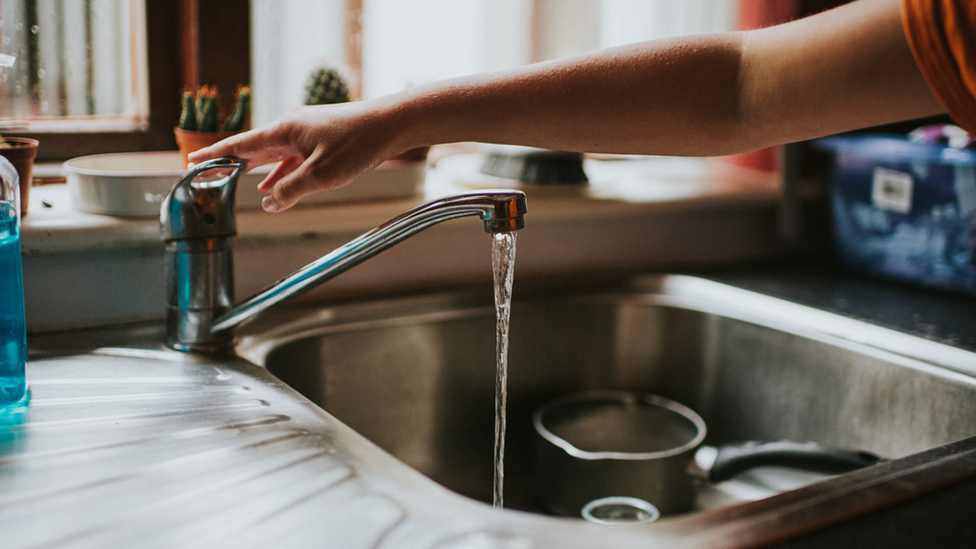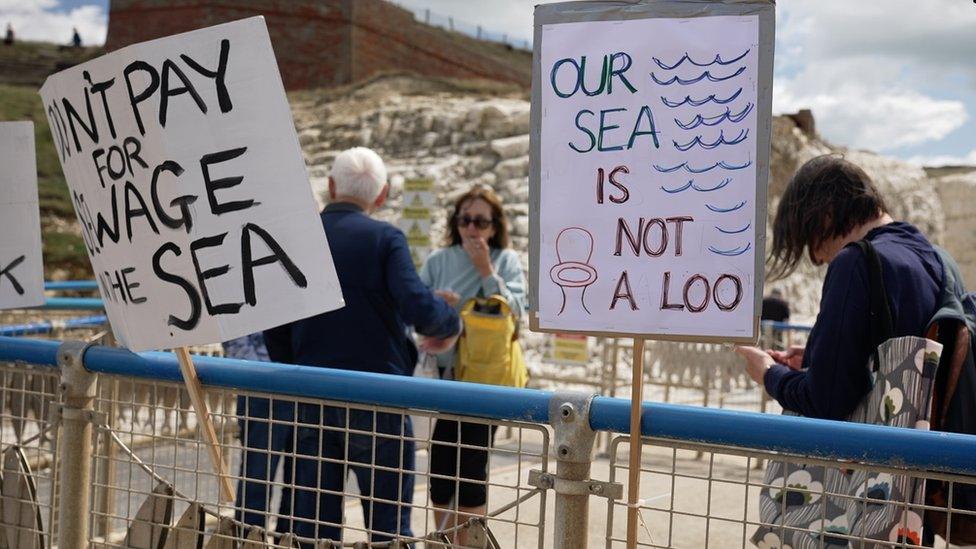Water firms want bill rises to cut leaks and spills
- Published
- comments

Water companies in England and Wales want bills to increase by £156 a year by 2030 to pay for upgrades and reduce sewage discharges.
The increase would allow infrastructure spending to almost double to £96bn, the water industry says.
But the proposals come amid public anger at the amount of sewage being discharged into rivers and seas and continued cost of living pressures.
Water industry regulator Ofwat has been asked to approve the plans.
If given the green light, water companies say the "record-breaking" investment proposals will secure the country's water supply in the long-term.
However, critics say customers should not be asked to foot the bill, arguing water companies have failed to invest adequately since they were privatised more than 30 years ago, with profits going to shareholders instead.
The industry says standards have improved significantly over that period, with more than £200bn invested in improving water infrastructure, but that more is "urgently" needed.
The bill rises will vary between the water companies, which have to submit individual investment plans for the 2025-2030 period to Ofwat on Monday. The regulator will then scrutinise the plans.
Under the proposals, charges will go up gradually, initially by an average of £84 in 2025 rising each year to £156 extra by 2030.
The increases being proposed are in current prices. However, inflation means customers will eventually see bill increases that are higher than that in terms of the pounds they pay.
Clean water campaigner Feargal Sharkey told the BBC's Today programme he thought the proposals were a "breathtakingly catastrophic strategy" for the industry.
He said Ofwat had previously acknowledged that water companies had received enough money "to develop, build and maintain a sewage system capable of properly dealing with our sewage".
"So I don't know why Ofwat would ever agree that the customer should pay again for a second time for a service we've never received," Mr Sharkey said.
The GMB union said the planned bill increases were an "insult", as water companies had "paid out billions in dividends, dumped millions of gallons of sewage in rivers and seas and failed to invest for decades".

Water UK said water companies were planning the "most ambitious modernisation of sewers since the Victorian era" and by the end of the decade said it could reduce leaks by a quarter compared with 2020. A new reservoir would be constructed for the first time for 30 years.
It also said it would cut sewage spills into waterways by more than 140,000 each year by 2030. Water companies spilled sewage into rivers and seas more than 300,000 times in 2022.
David Henderson, chief executive of Water UK, which represents the water companies, defended the industry's investment record.
"Since privatisation, £200bn has been invested, almost double the rate before privatisation. Drinking water is... now at the highest standard in the world," he told the Today programme.
"Leakage [is] down by a third. There's two-thirds less ammonia and phosphorus entering our rivers. The number of beaches classed as excellent is up seven-fold. And on top of that bills have been kept low. Since 2010, water bills on average have fallen by nearly a fifth.
More households would qualify for support with their water bills, he said, up from one million to three million.
Ofwat said water firms' plans would be subject to "forensic" scrutiny, and a series of public meetings in October and November would allow customers to have their say.
The regulator will publish a draft version of its response to each firm's plan in May next year. A final decision on what firms can charge will be announced in December.
Ofwat said it was looking for "a step change" in performance across the sector, adding that customers should be paying for future investment "not past company mistakes".
However, there was a "pressing need" to tackle pollution from storm overflows, improve bathing water and strengthen capacity, in the face of climate change and population growth.
"We will continue to monitor companies' performance, hold them to account for delivering improvements and push them to build meaningful plans to change," said Ofwat chief executive, David Black.
Environment Secretary Therese Coffey broadly welcomed the investment plans, but said Ofwat should ensure customers do not "pay the price for poor performance".
Last week, the regulator ordered water companies to pay back £114m to customers through lower bills after missing key targets during the current five-year period.

Are you worried about your water bill? Get in touch by emailing haveyoursay@bbc.co.uk, external.
Please include a contact number if you are willing to speak to a BBC journalist. You can also get in touch in the following ways:
WhatsApp: +44 7756 165803
Tweet: @BBC_HaveYourSay, external
Please read our terms & conditions and privacy policy
If you are reading this page and can't see the form you will need to visit the mobile version of the BBC website to submit your question or comment or you can email us at HaveYourSay@bbc.co.uk, external. Please include your name, age and location with any submission.


Sign up for our morning newsletter and get BBC News in your inbox.
